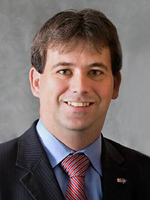A Post-Session Q & A With Senate Education Chairman John Legg
We sat down with Senate Education Committee Chairman John Legg to talk about the recently completed legislative session.
Legg said it was a good year for schools, with the budget boosting per student funding and lawmakers adding more options for students who want to earn college credit while still in high school.
On the year’s most controversial proposal — expanding the private school tax credit scholarship program — Legg said the Senate gave up on its idea to require those students take the same statewide standardized test as public school students. But the final bill does require more auditing and should provide more data to assess how well the program is working.
Legg also talked about a proposal to make it easier for charter schools to open and what influence, if any, the governor’s race had on lawmaker decisions. Below are excerpts from the interview.
For what passed and what didn’t, check out these recaps from the Tampa Bay Times and Travis Pillow at redefinED.
Q: You guys wrapped up the legislative session last week. You’re chairman of the education committee. I’m going to start — just give me a summary of what happened with education during the session?
A: It was a good year for education this year. We took on some big reforms, but what we did was the reforms that we did were based at the district level. We’ve allowed for some stability to take place, but also made adjustments on reforms that we’ve done over the last decade dealing with school grading, dealing with some acceleration. But all in all, it was a year of stability and a year of increased funding.
Q: The biggest issue was the private school scholarships. You guys on the last day came in, amended a bill, added that language in after the day before it seemed like maybe that bill was done for the session. Can you talk about that process and talk about what changed over the course of the last week and why the Senate decided to go ahead and expand that program without the testing requirement President Gaetz talked about early in the session?
A: One of the things I’ve realized in the process — this is going on my 10th session — is that it’s never over til it’s over. And there is no bill that’s dead until midnight on the last day of session.
What happened is that the Senate came in and amended — actually a bill that we worked on quite a bit, which was Senate bill 850 that dealt with collegiate high schools and middle school acceleration. And they added the tax credit scholarship. The Senate adopted the tax credit scholarship that was part of the President and Speaker’s work plan 2.0.
But the president all along has said he wanted some accountability. We still got that accountability. It was in a little bit of a different form. There was some significant increase in financial audits; some different types of accountability dealing with testing and testing evaluation. The Senate felt as though we were able to get some accountability that we felt long-needed in the tax credit scholarship, but also allowing what the speaker wanted, which was an increase in the program.
Q: You guys moved the evaluation of the program to Florida State. How do you think that will change the kinds of information that we get about the program?
A: We’re hoping, or I am at least hoping, is that it will be a little bit more, a little quicker. We will have some better cross-reference tabulations, and be able to compare across the state a little bit better. So we’re optimistic about a higher degree of transparency into the program.
Q: And the bill requires more of a longitudinal look, is that right?
A: It does. It looks at the longitudinal look of the individual program and not so much the individual students. So what we can see as a whole is: is this program being successful or are the achievements lower?
Q: What do you make of the budget funding for this year…you guys had a billion-dollar surplus coming into the year. Do you think that the education funding is reasonable? Do you think the state could have done more?
A: The funding is a significant improvement. Obviously, we’re not to the mark where were when the recession first hit us. But no one is. And it’s going to take us a couple of years to get back there, but we took a significant step forward.
As a whole, we had about 3 percent increase in the total numbers — actually 3.14 in the total numbers. And on a per student basis for the FEFP it was, I believe, 2.61, which is an increase. We’re getting close, closer to the all-time high mark. I’m hopeful as the economy improves we’ll keep getting there. In my view, as chairman of education, is it enough for education? It’s never enough, but I believe it was a good faith step forward to going in the right direction.
Q: Another bill that came up…was the standard charter school contract. This is something you have some experience with having founded a charter school. Some members of the Legislature, especially in the Senate pushed back against what the House was proposing. Tell me why and where do you think that conversation is going in future years?
A: The issue with charter schools is going to be an issue that we’ll probably be looking at in the next two years. We did a fairly large charter bill in 2013 that allowed the Department of Education to come up with a model contract. It’s my view as well as many other Senate colleagues view, that we needed to give that a chance to work.
One of the issues that we’re having with charters — I’m a very strong charter advocate — is that it’s the self-fulfilling prophesy. Many advocates want a model contract out there so that they can create more charter schools, which I think is a good thing.
But at the same time, there is this need for capital dollars for charter schools that the requests last year, at least on the initial House, was over $100 million dollars. So if you have more charters you’re going to have a need for more capital. And I believe the current capital system funding our charter schools needs to be reviewed. And I think we need to look at where that money’s going; making sure it remains in the public sector — that the assets remain for the public; but at the same time that we fund the capital for the charter schools and that it just doesn’t go into lease options that maybe get turned over to private corporations and a few years after the charter school may move on.
So the Senate’s looking at a holistic view on it. Charter schools are growing around 10 percent a year. I think that’s a healthy growth rate. I don’t think we need to accelerate it any faster right now. There are some legitimate issues that they brought up. But we just felt this wasn’t the year to tackle those issues since we tackled them last year. We need a little bit more time to review it. We had other issues dealing with school grades, dealing with technology, dealing with school acceleration, that took the time of the Senate.
Q: One of the things that legislative observers were speculating about was that some of the agenda in Tallahassee this year, particularly the private school scholarship bill expansion, were motivated by the concern that Gov. Scott wouldn’t be in office next year and that this would be your last chance to do some of those things. Is that accurate?
A: No, I don’t think it’s accurate at all. It’s always unique to find what comes into the policy soup and when things get pushed. The idea of Rick Scott not being there — the presumptive nominee for the Democrats was Charlie Crist. Unless he’s changed his position he’s always been a strong advocate of the tax credit scholarship. He’s always been a strong advocate of charter schools and school choice.
So when it comes to those education choice options, Rick Scott and Charlie Crist have always said the same things. Obviously I’m a little partisan. I’m a little biased toward Rick Scott. I’ve found that Charlie Crist, it’s hard to pin him down from one year to the next. While history has shown that former Gov. Charlie Crist has been supportive, I don’t know about the future Charlie Crist, where he is on it.


